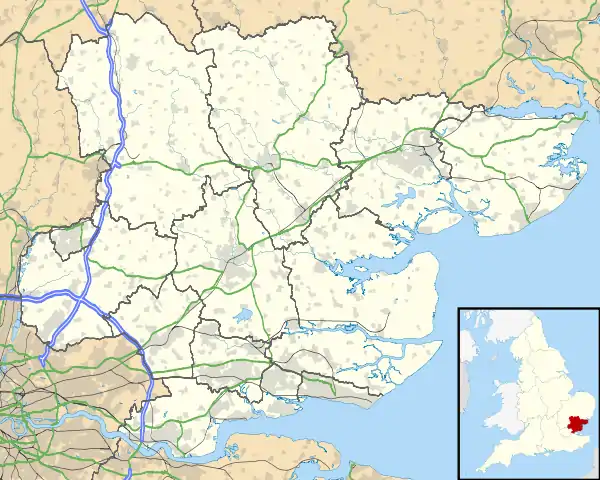| Corn Exchange, Manningtree | |
|---|---|
_(cropped).jpg.webp) Corn Exchange, Manningtree | |
| Location | High Street, Manningtree |
| Coordinates | 51°56′43″N 1°03′47″E / 51.9453°N 1.0631°E |
| Built | 1865 |
| Architect | Frederick Barnes |
| Architectural style(s) | Neoclassical style |
Listed Building – Grade II | |
| Official name | County Library |
| Designated | 17 November 1966 |
| Reference no. | 1254192 |
 Shown in Essex | |
The Corn Exchange is a commercial building in the High Street in Manningtree, Essex, England. The structure, which is now used as a public library, is a Grade II listed building.[1]
History
In the mid-19th century, a group of local businessmen decided to form a company, to be known as the "Manningtree Corn Exchange and Cattle Market Company", to finance and commission a purpose-built corn exchange for the town. The site they selected was on the south side of the High Street.[2]
The building was designed by Frederick Barnes of Ipswich in the neoclassical style, built by George Hewitt also of Ipswich in white brick with a stucco finish at a cost of £1,600, and was officially opened on 31 August 1865.[3][4][5] The design involved a symmetrical main frontage of three bays facing onto the High Street. The central bay, which was taller and slightly recessed, contained a tetrastyle portico formed by four Ionic order columns supporting an entablature and a cornice. On the first floor, there was a central round headed window, while the outer bays were fenestrated by round headed windows at ground floor level. All three bays were surmounted by parapets and cornices. Internally, the principal room was the main trading hall.[6]
The use of the building as a corn exchange declined significantly in the wake of the Great Depression of British Agriculture in the late 19th century,[7] and, from about 1900, it was used as a venue for public entertainment.[8] In the early 1960s, Tending Rural District Council considered proposals for demolition of the building, but the Manningtree Society successfully campaigned for its retention.[9] Instead, it was converted for use as a church for the trustees of the Roman Catholic Diocese of Brentwood, to a design by Raymond Erith, between 1966 and 1967.[10]
In the mid-1980s, it was converted again, this time for use as a public library.[11] The Manningtree and District Museum Local History Group secured a room in the building to display its collection to the public at that time.[12] Items in the collection include local memorabilia and photographs.[13]
See also
References
- ↑ Historic England. "County Library (1254192)". National Heritage List for England. Retrieved 23 July 2023.
- ↑ Walker, Wendy (1981). Essex markets and fairs. Essex Record Office. p. 27. ISBN 978-0900360596.
- ↑ The Essex Almanack and County Handbook. 1866. p. 127.
- ↑ Wilson, John Marius (1866). The Imperial Gazetteer of England and Wales; Embracing Recent Changes in Counties, Dioceses, Parishes, etc. A. Fullarton and Company. p. 268.
- ↑ "Manningtree and Mistley Conservation Area Character Appraisal and Management Plan" (PDF). Tendring District Council. 1 April 2022. p. 32. Retrieved 23 July 2023.
- ↑ Provincial News. The Builder. 16 August 1865. p. 612.
- ↑ Fletcher, T. W. (1973). 'The Great Depression of English Agriculture 1873-1896' in British Agriculture 1875-1914. London: Methuen. p. 31. ISBN 978-1136581182.
- ↑ Peers, Deborah (February 2009). "Once upon a time in... Manningtree". Essex Life. Archant Life. p. 52.
- ↑ "Manningtree: Heritage society confined to history after shortage of new members came forward". East Anglian Daily Times. 23 October 2012. Retrieved 23 July 2023.
- ↑ Archer, Lucy; Powell, Kenneth; Terry, Quinlan; Smith, George Suamarez (2004). Raymond Erith Progressive Classicist 1904–1973. Soane Gallery. p. 80. ISBN 978-0954228484.
- ↑ Bettley, J.; Pevsner, N. (2007). The Buildings of England Series: Essex. Yale University Press. p. 588. ISBN 978-0300116144.
- ↑ Dickie, Sarah (2004). From Tiller to Tide: A Maritime Survey of Essex. Essex Record Office. p. 16. ISBN 978-1898529224.
- ↑ "Magical Manningtree". Great British Life. 29 November 2010. Retrieved 23 July 2023.